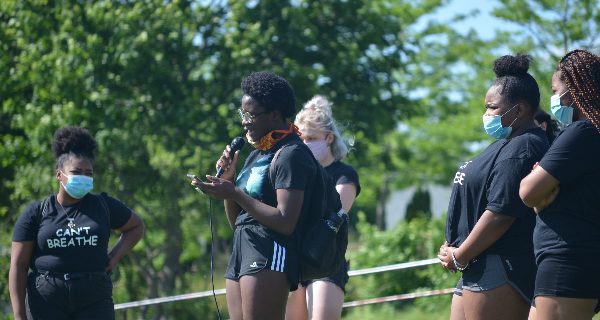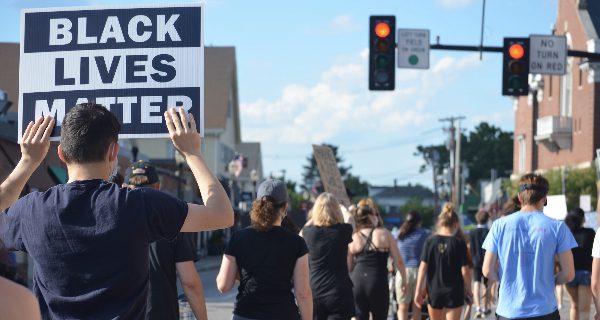Protestors march through Needham Center towards the Town Hall.
By Maddie Gerber
Hometown Weekly Intern
“My full name is Oluwatoni,” said recent NHS graduate Olu Ajayi, addressing the hundreds of black-clad Needhamites who were gathered on Memorial Field below her. “It’s said exactly as it’s spelled and we learn how to sound things out in kindergarten.” However, despite the relative simplicity of her name, Ajayi noted that when she moved to Needham when she was five, her teachers asked if they could call her “Toni” out of convenience. While, for a kindergartener, this may have seemed like an inconsequential shift, when reflecting on the situation, Ajayi noted that she “wished back then someone had looked me in the eye and told me to make them say my name. My full name. Because it’s not that hard to say … that was the first time an adult in this community failed me.”
Ajayi’s sentiment reflected the central idea of Friday afternoon’s rally; racism is not a distant problem, it’s a Needham problem, too.

On Friday afternoon, hundreds of Needham High School students, teachers, and other community members gathered together for a “Black Lives Matter” rally, inspired by the unjust murder of George Floyd and the protests and activism that have ensued as a result. While many NHS staff members were in attendance, including Principal Aaron Sicotte, this event was organized and run entirely by students, who felt that Needham had a responsibility to address racism and took it upon themselves to courageously start this conversation.
In a majority white and overwhelmingly privileged area, it’s very easy to dismiss racism as an issue that exists “out there,” but certainly not in our safe suburban bubble. According to rising senior and rally organizer Katie St. Peters, “We learn about the history of racism in school, but it is always made to feel like a distant issue.” For St. Peters, the purpose of the rally was to spark a conversation in Needham about the racism that exists not only in our country, but also inside of our community, infiltrating our educational system, our stores, and our streets. She and the rest of the student organizers hoped that hearing the stories of fellow Needhamites would help educate others on the issues that still plague our community and inspire them to be part of the necessary change.
The rally started at Memorial Field, where a group of current and former NHS students addressed the crowd from their perch on the infamous hill. Many of the speakers had been affected by racism themselves and told stories of racial profiling and discrimination that they and people they knew had faced. Additionally, many white students joined their black peers on the hill, discussing ways to be a good ally and how to go beyond “performative” activism to make a lasting difference. According to recent NHS graduate Adi Arbel, oppression has happened and continues to happen at the hands of white people, meaning that they also have a responsibility to help dismantle it.
Once the students were done speaking, they led the crowd down Highland Avenue, circling around the police station and stopping at Town Hall. Peaceful protestors flooded the streets, holding signs and filling the air with chanting and shouting. Police officers escorted the march through town, helping redirect traffic and following along on their bicycles.
At Town Hall, the student leaders mounted the steps to face the crowd. One at a time, they read the names of recent black lives that had been taken due to police brutality, allowing the crowd to repeat the names back to them in solidarity. As the list dwindled down, Principal Sicotte was handed the microphone and read the final few names, ending with George Floyd. According to rising senior Trixie Ogbebor, who also helped organize the rally, standing on the steps was the most powerful moment of the event. “I looked out to the crowd and saw my friends and family and it felt like we were one big community … I felt like we were truly on our way to change.”
According to Mr. Sicotte, this moment was really important to him as well, not only as an administrator, but also as a member of the Needham community. “I think we all recognize the power in partnership,” he said, noting how important it is to “demonstrate that many of us from all walks of life and positions in life are united in this fight for change.” Many of the student speakers criticized the Needham Public School administration for not appropriately handling the issue of racism in the classroom. In response to this, Sicotte did acknowledge that “we have an awful lot we still need to do ahead of us.” For the principal, “hearing students call for improvements at the rally was further inspiration to not only continue with our changes, but also to make sure students truly see them and feel them in their lived experiences at NHS. The leaders at NHS are standing fully with the messages of the rally, and we are dedicated to doing the important work to create real systemic change at NHS.”
The rally, which up until that point had been filled with voices calling for change, ended in silence. The entire crowd knelt quietly for 8 minutes and 46 seconds, symbolizing the amount of time that police officer Derek Chauvin knelt on George Floyd’s neck, killing him. The stillness of that moment was immensely powerful, perhaps even louder than the chanting and shouting that had preceded it. It represented not only the horrible injustice of the racism that surrounds us, but also the incredible capacity for change that the Needham community possesses. It amplified the cry for help that black people have been uttering for many years, but hopefully allowed the Needham community to finally listen.
“I’ve been fighting for myself for so long," said Ogbebor, "and hopefully now I don’t have to do it alone.”




















